2018年牛津上海版(深圳)英语六年级下册全册知识点总结
- 格式:doc
- 大小:100.50 KB
- 文档页数:7
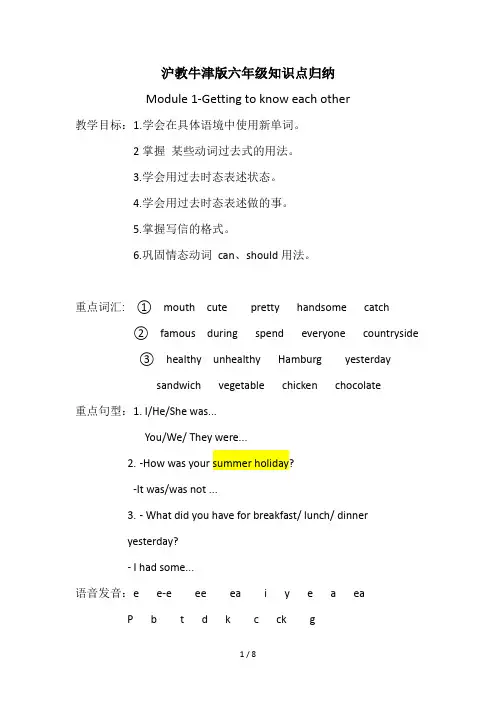
沪教牛津版六年级知识点归纳Module 1-Getting to know each other教学目标:1.学会在具体语境中使用新单词。
2掌握某些动词过去式的用法。
3.学会用过去时态表述状态。
4.学会用过去时态表述做的事。
5.掌握写信的格式。
6.巩固情态动词can、should用法。
重点词汇: ①mouth cute pretty handsome catch②famous during spend everyone countryside③healthy unhealthy Hamburg yesterdaysandwich vegetable chicken chocolate重点句型:1. I/He/She was...You/We/ They were...2.-How was your summer holiday?-It was/was not ...3.- What did you have for breakfast/ lunch/ dinneryesterday?- I had some...语音发音:e e-e ee ea i y e a eaP b t d k c ck gModule 2-Relationship教学目标:1.学会在具体语境中使用新单词。
2掌握某些动词过去式的用法。
3.学会用一般过去时的疑问句。
4.巩固wh - questions 在过去语态中的用法。
5.掌握数词hundred,thousand的用法。
6.巩固Would like to...句型和There be ...句型。
重点词汇: ①neighbour son daughter noisy dig② thousand hundred wild way die learn send③e-friend country other hobby重点句型:1. - Did you +动词原形+过去时间?- Yes,I did./ No,I didn’t.2.There was a...in the past.There were many...in the past.3.-Would you like to ...-Yes,I’d like to./No, I wouldn’t.语音发音 a ar u o ue u-e oo uf v thModule 3-Out and about教学目标:1.学会在具体语境中使用新单词。

牛津英语六年级下知识点牛津英语六年级下知识点总结英语作为一门国际通用语言,是学生学习的重要科目之一。
牛津英语是一套广泛使用的教材系列,其中六年级下册是该系列的最后一本教材,内容涵盖了六年级学生所需掌握的各个知识点。
本文将对牛津英语六年级下课程中的重要知识点进行总结,以帮助学生更好地理解和掌握这些知识。
1. 语音和字母在六年级下册中,学生将学习一些重要的语音和字母规则。
比如,学生将学习重音的规则,如何正确发音以及如何辨别元音和辅音。
此外,学生还将学习字母的拼写和正确书写方法,包括大小写字母的区分和字母的连写等。
2. 单词和词汇六年级下册将引入大量的新单词和词汇,学生需要通过课堂学习和课后复习来巩固记忆。
常见的词汇主题包括人物、动物、食物、交通工具、家庭、自然等等。
学生需要通过不断的练习和记忆来掌握这些词汇,并能够在实际应用中正确运用。
3. 语法知识语法是英语学习中的重要组成部分,六年级下册将进一步扩展学生的语法知识。
学生将学习更多的时态和语态,如一般现在时、一般过去时、将来时等。
此外,学生还将学习修饰语的用法,如形容词、副词、介词等,以及复合句的构成和运用。
4. 阅读理解和写作技巧六年级下册将注重培养学生的阅读理解和写作能力。
学生将通过阅读不同类型的文章、故事和新闻来提高自己的理解能力和阅读速度。
同时,学生还将学习如何写作简单的句子和段落,并加强对语法和词汇的应用能力。
5. 口语和听力训练口语和听力是英语学习中非常重要的方面,六年级下册将进一步培养学生的口语和听力技能。
学生将通过课堂对话、角色扮演、听写和听力训练等活动来提高自己的口语表达和听力理解能力。
总结起来,牛津英语六年级下册涵盖了广泛而丰富的知识点,包括语音和字母、单词和词汇、语法知识、阅读理解和写作技巧,以及口语和听力训练等。
通过系统学习和积极练习,学生将能够更好地掌握这些知识点,并在实际运用中流利地表达自己。
希望本文能够帮助六年级学生更好地理解和掌握牛津英语六年级下的知识点。
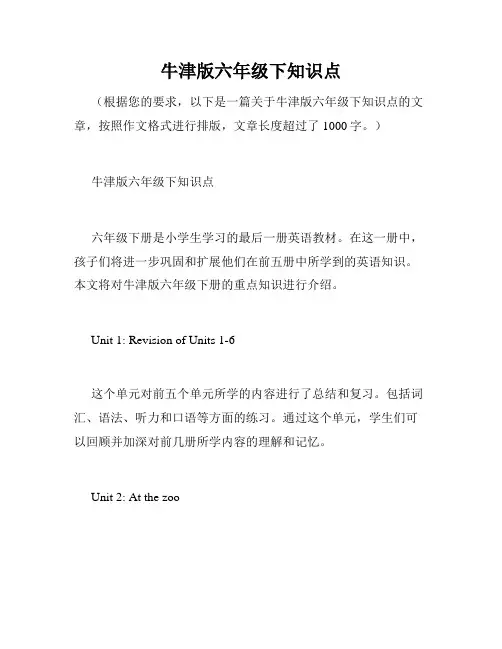
牛津版六年级下知识点(根据您的要求,以下是一篇关于牛津版六年级下知识点的文章,按照作文格式进行排版,文章长度超过了1000字。
)牛津版六年级下知识点六年级下册是小学生学习的最后一册英语教材。
在这一册中,孩子们将进一步巩固和扩展他们在前五册中所学到的英语知识。
本文将对牛津版六年级下册的重点知识进行介绍。
Unit 1: Revision of Units 1-6这个单元对前五个单元所学的内容进行了总结和复习。
包括词汇、语法、听力和口语等方面的练习。
通过这个单元,学生们可以回顾并加深对前几册所学内容的理解和记忆。
Unit 2: At the zoo这个单元主要介绍了动物园中的一些动物和与之相关的词汇、句型和表达方式。
孩子们将学习如何描述动物的外貌、特征和行为习惯,并能够用简单的句子进行表达和交流。
Unit 3: Food and drinks这个单元主要介绍了食物和饮料的名词、形容词和动词的用法。
通过学习这个单元,学生们将能够用英语描述他们喜欢或不喜欢的食物,还可以谈论自己的饮食习惯和健康意识。
Unit 4: Around town这个单元围绕城市和日常生活展开。
学生们将学习如何用英语描述城市中的建筑物、交通工具和活动场所,并能够就如何给别人指路进行简单的对话。
Unit 5: At the farm这个单元介绍了农场生活和农产物,并通过一些练习和任务,帮助学生们了解农业的重要性。
学生们将学会用英语描述农场中的动物和农作物,并能够提出一些简单的问题和回答。
Unit 6: Feelings这个单元主要探讨了情感和情绪的表达。
学生们将学习如何用英语表达自己的情感和感受,并学会用一些形容词和副词来描述情绪和情感。
除了以上介绍的单元,牛津版六年级下册还包括一些综合性的练习和任务,目的是帮助学生们综合运用所学的知识和技能,提高他们的英语综合应用能力。
总而言之,牛津版六年级下册是一个以巩固和扩展前期英语知识为目标的教材。
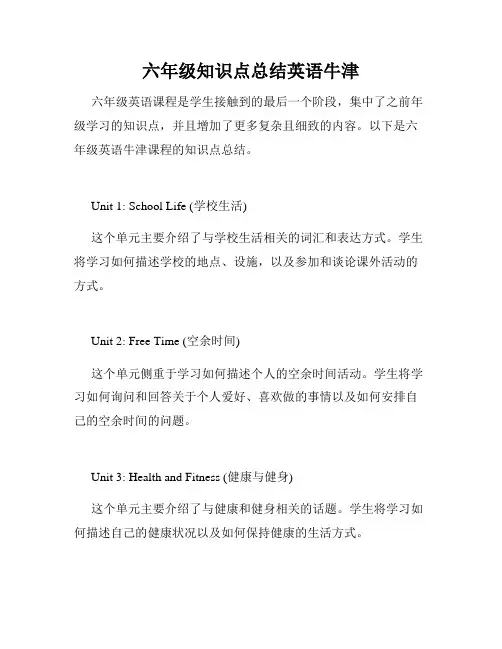
六年级知识点总结英语牛津六年级英语课程是学生接触到的最后一个阶段,集中了之前年级学习的知识点,并且增加了更多复杂且细致的内容。
以下是六年级英语牛津课程的知识点总结。
Unit 1: School Life (学校生活)这个单元主要介绍了与学校生活相关的词汇和表达方式。
学生将学习如何描述学校的地点、设施,以及参加和谈论课外活动的方式。
Unit 2: Free Time (空余时间)这个单元侧重于学习如何描述个人的空余时间活动。
学生将学习如何询问和回答关于个人爱好、喜欢做的事情以及如何安排自己的空余时间的问题。
Unit 3: Health and Fitness (健康与健身)这个单元主要介绍了与健康和健身相关的话题。
学生将学习如何描述自己的健康状况以及如何保持健康的生活方式。
Unit 4: Nature and Environment (自然与环境)这个单元涵盖了有关自然与环境的相关词汇和概念。
学生将学习如何描述天气、自然风景、动植物以及环保议题。
Unit 5: Community and Society (社区与社会)这个单元主要集中在讨论社区和社会问题。
学生将学习如何描述他们周围的社区、社会组织以及重要的社会问题。
Unit 6: Travel and Adventure (旅行与冒险)这个单元专注于讨论旅行和冒险方面的话题。
学生将学习如何描述自己的旅行经历,并学习与旅行和冒险相关的词汇和表达方式。
Unit 7: Science and Technology (科学与技术)这个单元涉及了科学和技术领域的相关知识。
学生将学习如何描述科学发现、技术应用以及与科学和技术相关的词汇。
Unit 8: Jobs and Careers (工作与职业)这个单元主要关注工作和职业方面的内容。
学生将学习如何描述不同的职业以及与工作和职业相关的词汇和表达方式。
Unit 9: Global Issues (全球问题)这个单元涉及了全球性的问题。
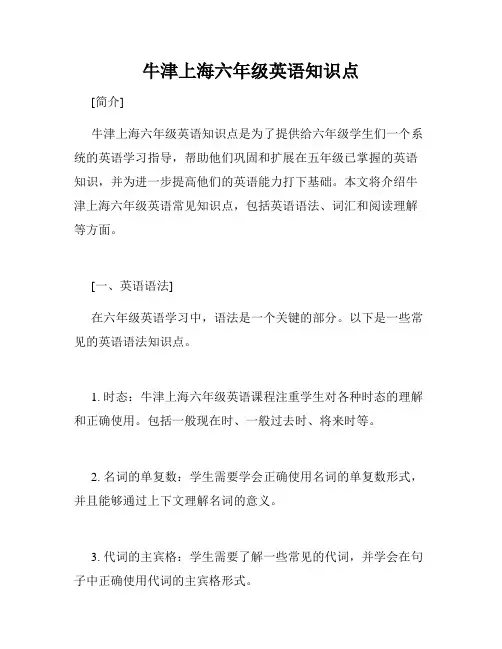
牛津上海六年级英语知识点[简介]牛津上海六年级英语知识点是为了提供给六年级学生们一个系统的英语学习指导,帮助他们巩固和扩展在五年级已掌握的英语知识,并为进一步提高他们的英语能力打下基础。
本文将介绍牛津上海六年级英语常见知识点,包括英语语法、词汇和阅读理解等方面。
[一、英语语法]在六年级英语学习中,语法是一个关键的部分。
以下是一些常见的英语语法知识点。
1. 时态:牛津上海六年级英语课程注重学生对各种时态的理解和正确使用。
包括一般现在时、一般过去时、将来时等。
2. 名词的单复数:学生需要学会正确使用名词的单复数形式,并且能够通过上下文理解名词的意义。
3. 代词的主宾格:学生需要了解一些常见的代词,并学会在句子中正确使用代词的主宾格形式。
4. 形容词和副词的比较级和最高级:学生需要学习形容词和副词的比较级和最高级形式,并能够正确运用于句子中。
5. 动词的不定式和动名词:学生需要学会区分动词的不定式和动名词形式,并且能够根据上下文理解其使用方式。
[二、英语词汇]在六年级英语学习中,词汇的掌握是非常重要的。
以下是一些常见的英语词汇知识点。
1. 基础词汇:学生需要熟练掌握一些常见的英语单词,包括表示人物、动物、食物等方面的词汇。
2. 时钟时间:学生需要学会用英语表达时间,并且能够读懂时钟上的时间。
3. 季节和月份:学生需要学会用英语表达四季和十二个月份,并且能够通过上下文理解相关的词汇。
4. 数字和计数:学生需要学会用英语表达数字,并且能够正确计数。
5. 学科词汇:学生需要学会一些与学科相关的词汇,比如数学、科学、地理等。
[三、阅读理解]在六年级英语学习中,阅读理解是培养学生阅读能力和理解能力的重要环节。
以下是一些常见的阅读理解知识点。
1. 阅读短文:学生需要学会阅读简短的英语短文,并且能够通过阅读内容回答问题。
2. 理解问题:学生需要根据短文内容,理解问题的意思,并能够准确回答问题。
3. 推理判断:学生需要通过上下文理解短文中的隐含信息,并能够进行推理判断。
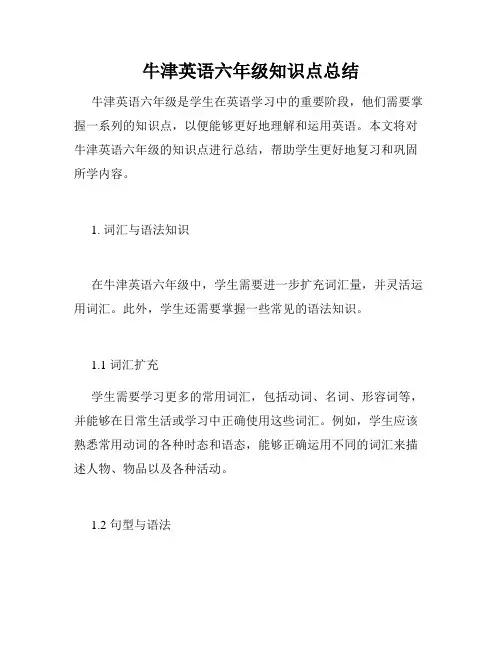
牛津英语六年级知识点总结牛津英语六年级是学生在英语学习中的重要阶段,他们需要掌握一系列的知识点,以便能够更好地理解和运用英语。
本文将对牛津英语六年级的知识点进行总结,帮助学生更好地复习和巩固所学内容。
1. 词汇与语法知识在牛津英语六年级中,学生需要进一步扩充词汇量,并灵活运用词汇。
此外,学生还需要掌握一些常见的语法知识。
1.1 词汇扩充学生需要学习更多的常用词汇,包括动词、名词、形容词等,并能够在日常生活或学习中正确使用这些词汇。
例如,学生应该熟悉常用动词的各种时态和语态,能够正确运用不同的词汇来描述人物、物品以及各种活动。
1.2 句型与语法在六年级,学生需要理解并运用一些复杂的句型和语法结构。
例如,学生应该能够正确使用比较级和最高级来进行描述,掌握被动语态的用法,理解并运用条件句和虚拟语气等。
2. 阅读理解阅读理解是英语学习中非常重要的一部分,通过阅读能够提高学生的语言理解能力和阅读能力。
在六年级,学生需要阅读各种不同题材的文章,并能够正确理解并回答相关问题。
2.1 理解词义学生需要通过上下文理解词义,掌握一些常见的词汇搭配和短语用法,从而能够准确理解文章中出现的生词和难词。
2.2 主旨大意学生需要能够通过阅读文章的段落和标题,理解文章的主旨大意,并能够回答与文章内容相关的问题。
3. 听力技巧在牛津英语六年级的学习中,学生需要提高自己的听力技巧,能够准确理解并回答听力材料中的问题。
3.1 听懂对话学生需要通过听力材料,能够听懂日常生活中的对话,包括人物的名字、地点、时间以及具体的活动内容。
3.2 提取关键信息学生需要通过听力材料,能够准确提取关键信息,包括人物的观点、意见、喜好等,从而能够回答与听力材料相关的问题。
4. 口语表达牛津英语六年级的学习也涉及到口语表达,学生需要能够流利地用英语进行口头交流,以及正确运用一些常用口语表达。
4.1 日常交流学生需要通过与他人的交流,能够用英语进行日常生活中的问候、介绍、询问信息等。

六年级第二学期牛津英语知识点梳理Unit One Great cities in Asia打*的知识点仅供参考知识点梳理:I 词组1.at an exhibition 在展览会上2.the capital of China 中国的首都3.north-east of Shanghai 在上海东北面east/ west/ south / north of 在……的东、西、南、北面north-east /north-west of 在……的东北、西北south-east /south- west of 在……东南,西南* in/on/to the east ofeg. Shanghai is in the east of China.Korea is on the east of China.Japan is to the east of China.3.how far 多远4.how 如何/怎样5.how long 多久6.in the past 在过去7.other places 其他城市8.from shanghai to Beijing 从上海到北京9.read some information about Beijing 阅读关于北京的信息10.the Great Wall 长城*the Summer Palace 颐和园*the Palace Museum 故宫博物院11.more than= over 超过* less than = under 少于12.15 million people 一千五百万人*millions of, thousands of13.huge department store 大型百货公司*huge= very big14.spicy food 辣的食物15.in Asia 在亚洲16.great cities= big cities 大城市17.which city 哪个城市18.by plane=by air; 乘飞机by ship=by sea; 乘船by train/ ferry 乘火车/ 渡轮19.That’s right. 对的。
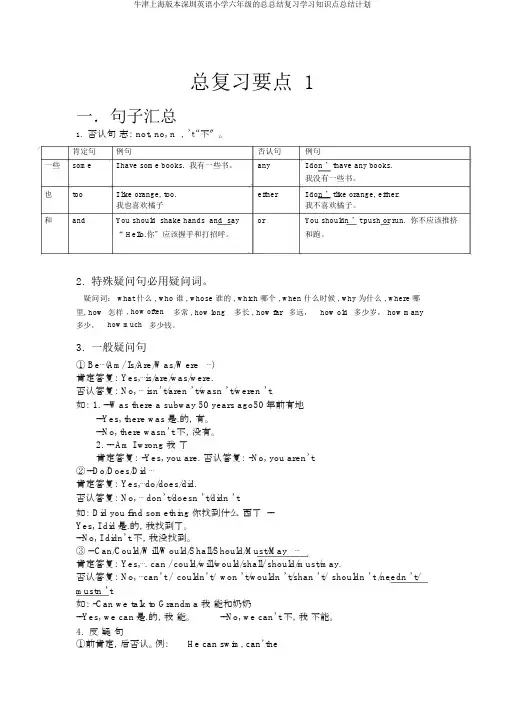
总复习要点 1一.句子汇总1.否认句志: not, no, n ,’t“不〞。
肯定句例句否认句例句一些some I have some books. 我有一些书。
any I don ’thave any books.我没有一些书。
也too I like orange, too. either I don ’tlike orange, either.我也喜欢橘子我不喜欢橘子。
和and You should shake hands and say or You shouldn ’t push or run. 你不应该推挤“ Hello.你〞应该握手和打招呼。
和跑。
2.特殊疑问句必用疑问词。
疑问词: what 什么 , who 谁 , whose 谁的 , which 哪个 , when 什么时候 , why 为什么 , where 哪里, how 怎样, how often 多常 , how long 多长 , how far 多远,how old 多少岁, how many多少,how much 多少钱。
3.一般疑问句① Be⋯(Am/ Is/Are/Was/Were⋯)肯定答复: Yes,⋯is/are/was/were.否认答复: No, ⋯ isn’t/aren ’t/wasn ’t/weren ’t.如: 1. --Was there a subway 50 years ago50年前有地--Yes, there was是.的,有。
--No, there wasn’t.不,没有。
2. -- Am I wrong 我了肯定答复: -Yes, you are. 否认答复: -No, you aren’t.②--Do/Does/Did ⋯肯定答复: Yes,⋯do/does/did.否认答复: No, ⋯ don’t/doesn ’t/didn ’t.如: Did you find something 你找到什么西了 --Yes, I did是.的,我找到了。
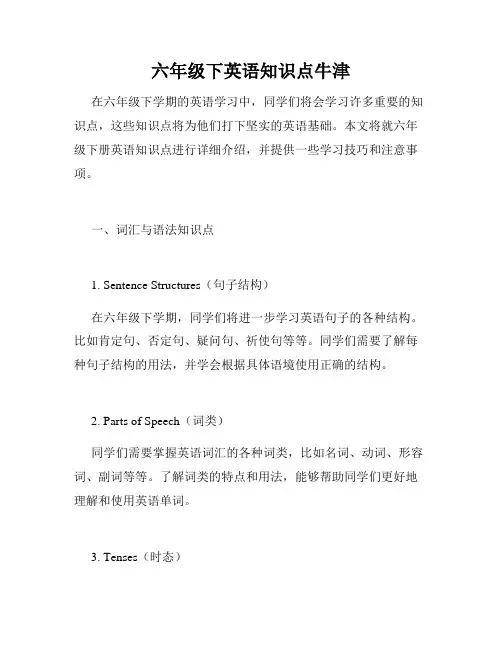
六年级下英语知识点牛津在六年级下学期的英语学习中,同学们将会学习许多重要的知识点,这些知识点将为他们打下坚实的英语基础。
本文将就六年级下册英语知识点进行详细介绍,并提供一些学习技巧和注意事项。
一、词汇与语法知识点1. Sentence Structures(句子结构)在六年级下学期,同学们将进一步学习英语句子的各种结构。
比如肯定句、否定句、疑问句、祈使句等等。
同学们需要了解每种句子结构的用法,并学会根据具体语境使用正确的结构。
2. Parts of Speech(词类)同学们需要掌握英语词汇的各种词类,比如名词、动词、形容词、副词等等。
了解词类的特点和用法,能够帮助同学们更好地理解和使用英语单词。
3. Tenses(时态)六年级下学期将会学习更多的时态,比如一般过去时、过去进行时、现在完成时等等。
同学们需要注意每种时态的动词形式和用法,并能够准确运用于实际语境中。
4. Vocabulary(词汇)同学们将会接触到更多的词汇,包括日常生活用语、学科名词、动词短语等等。
在学习词汇时,同学们可以通过多读多写,积累词汇量,提高自己的表达能力。
5. Prepositions(介词)掌握基本的介词用法对于理解句子意思至关重要。
同学们需要了解常见的介词用法,例如in, on, at等等,并能够准确地使用它们。
二、阅读与写作技巧1. Skimming and Scanning(略读与查读)在阅读理解中,同学们可以使用略读和查读的技巧帮助他们更好地理解文章。
略读可以帮助他们快速获取文章的大意,而查读可以帮助他们找到具体信息。
2. Inference(推理)同学们在阅读理解过程中需要善于推理,根据文章中的线索和上下文进行推断,理解作者的意图和文章的含义。
3. Writing Tasks(写作任务)写作是英语学习的重要组成部分。
同学们将会学习写作不同类型的文章,比如日记、书信、文章等等。
在写作过程中,同学们应该注意语法和拼写的正确性,同时也要追求表达的准确和流畅。

Unit 1 Who is younger? ⼀、语⾳: ir字母组合在单词中的发⾳ /E:/ ⼆、单词和习惯⽤语: (共21个) 四会单词和习惯⽤语(9个): young年轻的 go for a walk 去散步 glad ⾼兴的,乐意的 as…as 和……⼀样 tall⾼的 than⽐ short短的、矮的 strong 强壮的 heavy 重的 三会单词(10个): chat聊天 light轻的 sit(sat)坐 meet(met)遇见、见⾯ twin (双胞胎)之⼀ as作为 minute分钟 only惟⼀的、仅有的 child孩⼦(children孩⼦们) centimeter 厘⽶ ⼆会单词(2个): height⾝⾼ weight体重 三、词组: 1.on Sunday morning 在星期天早晨 2.go for a walk 去散步 3. look the same 看起来⼀样 4.as tall as 与…..⼀样⾼ as fat as 与…..⼀样胖as long as 与….⼀样长 5. shorter than ⽐….矮bigger than⽐⼤heavier than⽐重 6. twenty minutes younger⼩⼆⼗分钟 7.one year older⼤⼀岁 9.be glad to do ⾮常⾼兴做某事 10.a twin sister 双胞胎姐妹 11.how old 多⼤ 12.the only child 仅有的⼀个孩⼦ 13.a tall boy ⼀个⾼个⼦的男孩 14.a young teacher ⼀位年轻的教师 15.some heavy boxes ⼀些重的盒⼦ 16.your old friend(s)你的⽼朋友 17.a strong goalkeeper ⼀个强壮的守门员 18.the girl in red 穿红⾐服的⼥孩 19.yours or mine 你的还是我的 20.look young 看起来年轻 21.have a chat 聊天、闲谈 四、形容词⽐较级: A.直接加er/r tall---________light----________young--_________old---________strong--___ small--_________late---_________long---_________short--________ nice--- _____ B.双写加er big-------_________ fat-----_________ thin---________ hot---________ C.去y改i加er heavy---_________ early---__________ busy---__________ D不规则 good---_______ many---________ much---______ bad/ill ---_____ little---_______ 五、句型: 1、A+谓语(be动词)+形容词⽐较级+than +B A⽐B…… Who’s younger than him ? 谁⽐他年轻? My brother is younger than him . 我弟弟⽐他年轻。
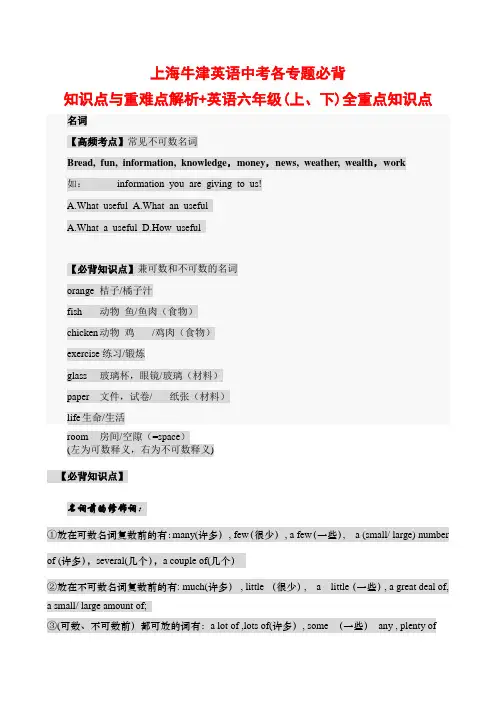
上海牛津英语中考各专题必背知识点与重难点解析+英语六年级(上、下)全重点知识点名词【高频考点】常见不可数名词Bread, fun, information, knowledge,money,news, weather, wealth,work如:_____ information you are giving to us!A.What useful A.What an usefulA.What a useful D.How useful【必背知识点】兼可数和不可数的名词orange 桔子/橘子汁fish 动物鱼/鱼肉(食物)chicken 动物鸡/鸡肉(食物)exercise练习/锻炼glass 玻璃杯,眼镜/玻璃(材料)paper 文件,试卷/ 纸张(材料)life 生命/生活room 房间/空隙(=space)(左为可数释义,右为不可数释义)【必背知识点】名词前的修饰词:①放在可数名词复数前的有:many(许多), few(很少), a few(一些), a (small/ large) number of (许多),several(几个),a couple of(几个)②放在不可数名词复数前的有: much(许多), little (很少), a little(一些), a great deal of,a small/ large amount of;③(可数、不可数前)都可放的词有:a lot of ,lots of(许多), some (一些)any , plenty of区分:a lot 相当于very 表示“很,非常”,后面不能加名词;a lot of表示“很多”,后面加名词。
A number of表示“一些”,the number of 表示“…的数量”,前者谓语用复数,后者谓语用单数。
名词所有格's 表示“某人家”、“店铺”,省略后面的名词eg : at Mr. Green’s, to my uncle’s , at the doctor’s, at the tailor’s冠词【常考易错点】(必须记牢)A useful/ university/ European/one-eyed/+名词;a uniform/ unit/ used caran hour unusual(否定前缀)an + honest/ 8-year-old+名词【难点】冠词a/an在序数词前,表“又一”=anotherHe didn’t give up and took a seventh try.【必背知识点】the在序数词和形容词最高级前。
Module 1 Chan ges and differe nces一、核心词汇戳★・1. 名词kilogram千克;公斤(缩略形式kg) centimetre厘米(缩略形式cm) fan(足球、电影等)迷;爱好者theatre剧院life生活writer作家wish愿望;祝愿mou nta in 山;山脉space太空2. 动词weigh有... 重;重drive驾驶carry背;提;拿3. 其他poor贫穷的;差的;次的even甚至4. 短语street clea ne环卫工人二、拓展词汇★邛1. 名词photographer摄影师film胶卷broom扫帚wife妻子fairy仙子;小精灵PS附言(用于信末)din osaur恐龙2. 动词sweep扫地3. 形容词fantastic极好的digital数码的4. 副词on li ne在线地;在线的5. 代词themselves他们自己;她们自己;它们自己6. 其他taller更高的7. 短语go fishi ng去钓鱼enjoy on eself玩得愉快;得到乐趣get…in收割street sweeper扫地车by hand 用手right away 立即;马上in a short time 很快head teacher 校长 a piece of 一张;一片have a picnic去野餐better and better越来越好三、核心句型★★1. I'm 150 cen timetres tall.我身高150 厘米。
解读:这是介绍身高的句型。
“主语+ be动词+数字+长度单位(+ tall). ”可以用来介绍某人的身高。
举一反三:My cousin is 154 cen timetres tall.我的堂弟身高154 厘米。
Jim is 149 cen timetres tall.吉姆身高149 厘米。
2. There are a lot of tall buildings in the city.城市里有很多高大的建筑物。
六年级下册英语知识点牛津在六年级下册的英语学习中,有一些重要的知识点需要我们掌握。
下面将详细介绍这些知识点,以帮助同学们更好地学习和掌握英语。
一、单词的拼写和发音在六年级下册的英语学习中,我们需要掌握更多的单词。
正确的拼写和发音对于学习英语非常重要。
在学习单词时,我们可以通过多听、多读、多写来加深记忆。
例如,我们要学习单词“beautiful”。
当我们读这个单词时,我们要注意每个字母的发音,并把它们组合起来,正确地读成“biu-ti-fəl”。
二、语法知识的理解和运用语法知识对于构建正确的句子很重要。
在六年级下册的英语学习中,我们需要学习并运用一些重要的语法知识,例如时态、语态、被动语态、虚拟语气等。
例句1:We went to the park yesterday.(过去式)例句2:The book is being read by me.(被动语态)通过学习语法知识,我们可以更好地理解和运用英语语言,使我们的表达更准确和流畅。
三、口语交流和听力理解在六年级下册的英语学习中,我们需要重点培养口语交流和听力理解的能力。
我们可以通过多看英语电视剧、听英语歌曲和跟着录音进行模仿来提高口语能力。
在英语学习中,多听多练是非常重要的。
通过多听英语材料,我们可以提高对英语的听力理解能力,培养我们的语感。
四、阅读理解和写作能力在六年级下册的英语学习中,我们要提高自己的阅读理解和写作能力。
我们可以阅读英语故事、杂志、报纸等不同类型的文章来扩大自己的词汇量和阅读水平。
写作是培养语言表达能力的重要手段。
我们可以通过写英语日记、作文等方式来锻炼自己的写作能力。
五、小结六年级下册的英语学习中,有很多重要的知识点需要我们掌握。
通过学习和掌握单词拼写和发音、语法知识的理解和运用、口语交流和听力理解、阅读理解和写作能力,我们可以提高自己的英语水平。
希望同学们能够认真学习,不断提高自己的英语能力,在未来的学习和生活中能够灵活运用英语。
上海英语牛津六年级知识点上海英语牛津六年级课程旨在帮助学生巩固和扩展他们的英语知识和技能。
以下是上海英语牛津六年级的一些重要知识点。
1. 语法知识在牛津六年级英语课程中,学生将深入学习各种语法知识,包括时态、语态、从句、短语结构等。
1.1 时态学生将学习各种时态,例如一般现在时、一般过去时、一般将来时、现在进行时、过去进行时等。
他们将学习如何正确使用这些时态,并能根据上下文理解语句的时间关系。
1.2 语态学生将学习主动语态和被动语态的用法。
他们将学习如何转换句子的语态,并理解被动语态在不同语境中的应用。
1.3 从句学生将学习几种常见的从句,如名词性从句、定语从句和状语从句。
他们将学习如何正确构造和使用这些从句,以更好地表达自己的意思。
1.4 短语结构学生将学习一些常用的短语结构,如动词短语、介词短语和形容词短语。
他们将学习如何正确使用这些短语,并能在写作和口语中灵活应用。
2. 词汇和拼写在牛津六年级英语课程中,学生将扩展他们的词汇量,并提高他们的拼写能力。
以下是一些常见的词汇和拼写要点。
2.1 常见词汇学生将学习一些常见的词汇,如日常生活用语、动词、形容词、副词等。
他们将通过课堂练习和词汇表达活动来牢固掌握这些词汇。
2.2 拼写规则学生将学习一些拼写规则,如辅音字母重读闭音节词的变形规则、双写辅音字母规则等。
他们将通过拼写练习和拼写比赛来提高他们的拼写准确性。
3. 阅读理解阅读理解在牛津六年级英语课程中占有重要地位。
学生将学习如何从文字中获取信息,理解文章的主旨,推断意义等。
3.1 文章理解学生将学习如何快速浏览文章,并从中获取关键信息。
他们将学习如何确定文章的主旨,并通过答题来提升他们的文章理解能力。
3.2 推断意义学生将学习如何根据文章的上下文推断词语和短语的意义。
他们将通过阅读材料和探索词汇义项来提高他们的词汇推断能力。
4. 口语和听力在牛津六年级英语课程中,学生将加强他们的口语和听力能力。
六年级英语下册牛津知识点在六年级的英语下册中,学生们将继续学习一系列重要的牛津知识点。
这些知识点包括语法、词汇、阅读理解等方面,为学生提供了扎实的英语基础。
本文将从各个方面介绍这些重要的知识点。
一、语法语法是学习英语的重要组成部分。
在六年级下册的课程中,学生们将学习一些常见的语法知识点,如时态、被动语态、比较级和最高级等。
1. 时态时态是表示动作发生的时间的一种语法形式。
在六年级下册中,学生们将学习一些常见的时态,包括一般现在时、一般过去时和一般将来时等。
通过学习时态,学生们可以更好地表达过去、现在和未来的动作。
2. 被动语态被动语态是表示主语是动作的接受者而不是执行者的一种语法形式。
通过学习被动语态,学生们可以更好地理解和使用被动语态句子,并提升英语表达的多样性和准确性。
3. 比较级和最高级比较级和最高级是用来表示比较程度的一种语法形式。
在六年级下册的学习中,学生们将学习如何正确地构建比较级和最高级句子,并学会运用于实际的交流和写作中。
二、词汇词汇是语言的基本单位,掌握丰富的词汇量对学生的英语学习非常重要。
在六年级下册的学习中,学生们将继续扩大词汇量,学习一些新的词汇和短语。
1. 同义词和反义词同义词是指意思相同或相似的词语,而反义词则是指对立或相反意思的词语。
通过学习同义词和反义词,学生们能够提升词汇的灵活运用能力,丰富表达方式。
2. 前缀和后缀前缀和后缀是词汇构成的重要组成部分。
通过学习一些常见的前缀和后缀,学生们可以更好地理解词汇的构成规律,进而扩大词汇量。
三、阅读理解阅读理解是培养学生理解和运用英语的重要手段。
在六年级下册中,学生们将继续进行一系列的阅读理解训练,提高阅读能力和理解能力。
1. 短文阅读通过阅读短文,学生们可以锻炼阅读理解的能力,并掌握提取信息、推断意义和归纳总结的技巧。
在学习中,老师会帮助学生们更好地理解短文,并回答相关问题。
2. 段落阅读段落阅读是一种较长篇幅的阅读形式。
总复习要点1 一.句子汇总 1. 否定句标志:not, no, n’t,“不”。
2. 特殊疑问句必用疑问词。 疑问词:what什么, who谁, whose谁的, which哪个, when什么时候, why为什么, where哪里, how怎样, how often多常, how long多长, how far多远, how old多少岁,how many多少, how much多少钱。
3. 一般疑问句
①Be…(Am/Is/Are/Was/Were …? ) 肯定回答:Yes, … is/are/was/were. 否定回答:No, … isn’t/aren’t/wasn’t/weren’t. 如:1. --Was there a subway 50 years ago?50年前有地铁吗? --Yes, there was.是的,有。 --No, there wasn’t.不,没有。 2. -- Am I wrong?我错了吗? 肯定回答:-Yes, you are. 否定回答:-No, you aren’t. ②--Do/Does/Did …? 肯定回答:Yes, … do/does/did.
肯定句 例句 否定句 例句 一些 some I have some books. 我有一些书。 any I don’t have any books.
我没有一些书。 也 too I like orange, too. 我也喜欢橘子 either I don’t like orange, either.
我不喜欢橘子。 和 and You should shake hands and say “Hello”.你应该握手和打招呼。 or You shouldn’t push or run. 你不应
该推挤和跑。 否定回答:No, … don’t/doesn’t/didn’t. 如:Did you find something?你找到什么东西了吗? --Yes, I did.是的,我找到了。 --No, I didn’t.不,我没找到。 ③—Can/Could/Will/Would/Shall/Should/Must/May…? 肯定回答:Yes, …. can / could/will/would/shall/ should/must/may. 否定回答:No, …can’t / couldn’t/ won’t/wouldn’t/shan’t/ shouldn’t /needn’t/ mustn’t. 如:-Can we talk to Grandma?我们能和奶奶说话吗? --Yes, we can.是的,我们能。 --No, we can’t.不,我们不能。 4. 反义疑问句 ①前肯定,后否定。例:He can swim, can’t he? ②前否定,后肯定。例:He can’t swim, can he? 二. 语法汇总
名词 可数名词 单数 a + 辅音字母或发音 an+元音字母(a,e,i,o,u)或元音发音 a boy; a girl an hour; an apple
复数
直接加s desk-desks, day-days 以s, x, ch, sh,结尾,加es bus-buses; box-boxes, watch-watches; fish-fishes 以辅音字母+y结尾,把y改I,再加es party-parties; family-families 以辅音字母+o结尾,加es potato-potatoes; tomato-tomatoes 例外:photo-photos; piano-pianos. 以f, fe结尾,把f, fe改v,再加es knife-knives; life-lives 不规则变化 child-children; man-men; woman- women; foot-feet; goose-geese(鹅); tooth-teeth; mouse-mice(老鼠);people-people人; 不可数名词 不能按个数来计算的名词。没有复数。如:money, time;液体:water; coffee; juice...;细碎的东西:hair, 用法: 1. 人称代词的主格在句中作主语,宾格在句中作宾语。主语是句中描述的人或物,放在动此前;宾语是动词或介词所指向的对象,放在动词或介词后 如:I am learning English. (作主语) 我在学习英语。 We are waiting for them. (作宾语) 我们在等他们。
2. 形容词性物主代词+名词,名词性物主代词不加名词。形容词性物主代词+名词=名词性物主代词。如: ①My father is a teacher. (my是形容词性物主代词,后面必加名词) 我的爸爸是老师。 ②This is my homework. That is yours. ( yours是名词性物主代词,后面不加名词,等于“your homework”.) 这是我的作业。那是你的(作业)。
3. by+反身代词 意思是“亲自,独自”。 如:I do my homework by myself. 我独自做作业。
4. “某人的”用“’s” ,表示所属关系。如:汤姆的-Tom’s, 我妈妈的—my mother’s。用法如下
第一人称 第二人称 第三人称 单数 复数 单数 复数 单 数 复 数
人称代词
主格
I 我 we 我们 you 你 you 你们 he他 she她 it它 they 他们
宾格
me 我 us 我们 you 你 you 你们 him他 her 她 it 它 them 他们
物主代词 形容词性
my 我的 our 我们的 your 你的 your 你们的 his 他的 her 她的 its 它的 their 他们的
名词性
mine 我的 ours 我们的 yours 你的 yours 你们的 his 他的 hers 她的 its 它的 theirs 他们的
反身代词 myself 我自己 ourselves 我们自己 yourself 你自己 yourselves 你们自己 himself他自己 herself她自己 itself它自己 themselves 他们自己 连词 用法 意思 例句 and 并列关系 和 I brought sweet and sour pork. 我买了酸甜猪肉。 but 转折关系 但是 Mary likes spicy food but she doesn’t like sour food.玛丽喜欢辣食但不喜欢酸食。 so 因果关系 所以 I like vegetables so I brought vegetable soup.我喜欢蔬菜所以我带来了蔬菜汤。 because 因果关系 因为 I brought 4 apples because I like eating apples. or 选择关系 或者 I need some water or juice.我需要一些水或果汁。
介词(at, on, in, to, of, from, about, for, after, before, up, down, under,
near, between, by, over,out,off, with)后加n. 或v-ing。 1. at 的固定搭配 at first首先—at last最后,at the weekend在周末,at the top of…在…顶部, look at看着, at school在学校, at home在家,at Christmas在圣诞节,at war在战争中,at+具体时刻(at 11:00在11点),
2.on的固定搭配 on holiday在度假, on duty在值日, on foot 步行,on time准时, put on穿上, turn on开(灯,电视,电脑),on the earth在地球上, on the left/right在左/右边, get on上车,hold on请稍等,
3.in的固定搭配 in time及时, in the morning/afternoon/evening在早上/下午/晚上, in the past/future在过去/未来, in English用英语, in bed在床上,in the end最后, in this way用这种方法, in +地点(in Shenzhen在深圳), in+月份(in May在五月),in+季节(in summer在夏天),in space在太空里
4. to的固定搭配 be going to…将, go to去, listen to听, talk to…向…说话, near to…靠近, come to来, write to写信给…, from…to…从…到…, walk to…走路去…, the way to…去…的路, take…to…带到…, give…to…给…, have to不得不,add…to…添加…到…
名词所有格 (名词后加’s 表示所属关系) 单数名词直接加’s the boy’s schoolbag 男孩的书包 my father’s watch我爸爸的手表 复数名词已有s, 加[’] the boys’ schoolbags男孩们的书包 the teachers’ office老师们的办公室 复数名词没有s, 加’s Women’s Day妇女节 Children’s Day儿童节
几个人共有一样东西,只需在最后一个人后加’s Jim and Tom’s bedroom 吉姆和汤姆的房间 (两人共有)
各自拥有的东西,每个人后都要加’s Jim’s and Tom’s bike (吉姆和汤姆的自行车) (各自都有)